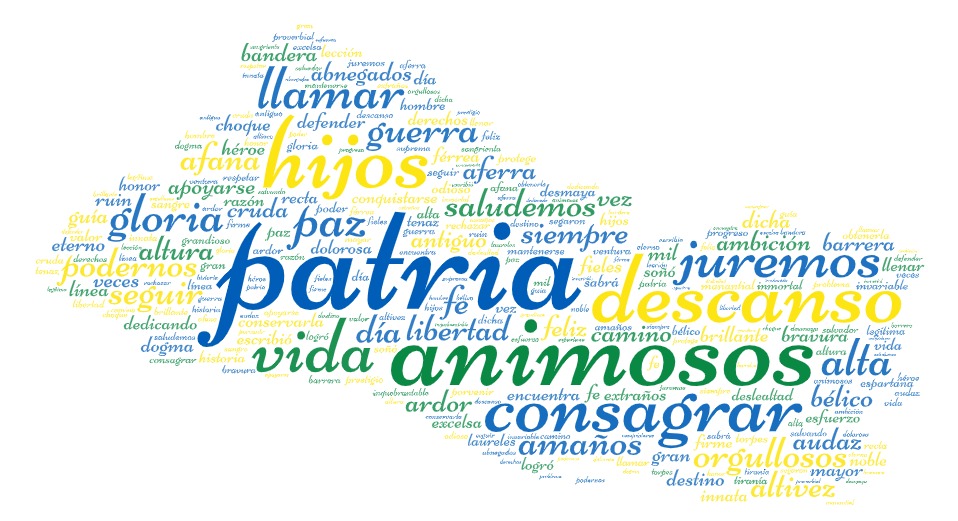
Length: 262 words
Anthem lyrics (use the arrow on the left to collapse this section):
Saludemos la patria orgullosos
De hijos suyos podernos llamar;
Y juremos la vida animosos,
Sin descanso a su bien consagrar.
De la paz en la dicha suprema,
Siempre noble soñó El Salvador;
Fue obtenerla su eterno problema,
Conservarla es su gloria mayor.
Y con fe inquebrantable el camino
Del progreso se afana en seguir
Por llenar su grandioso destino,
Conquistarse un feliz porvenir.
Le protege una férrea barrera
Contra el choque de ruin deslealtad,
Desde el día que en su alta bandera
Con su sangre escribió: ¡LIBERTAD!
Saludemos la patria orgullosos
De hijos suyos podernos llamar;
Y juremos la vida animosos,
Sin descanso a su bien consagrar.
Libertad es su dogma, es su guía
Que mil veces logró defender;
Y otras tantas, de audaz tiranía
Rechazar el odioso poder.
Dolorosa y sangrienta es su historia,
Pero excelsa y brillante a la vez;
Manantial de legítima gloria,
Gran lección de espartana altivez.
No desmaya en su innata bravura,
En cada hombre hay un héroe inmortal
Que sabrá mantenerse a la altura
De su antiguo valor proverbial.
Saludemos la patria orgullosos
De hijos suyos podernos llamar;
Y juremos la vida animosos,
Sin descanso a su bien consagrar.
Todos son abnegados, y fieles
Al prestigio del bélico ardor
Con que siempre segaron laureles
De la patria salvando el honor.
Respetar los derechos extraños
Y apoyarse en la recta razón
Es para ella, sin torpes amaños
Su invariable, más firme ambición.
Y en seguir esta línea se aferra
Dedicando su esfuerzo tenaz,
En hacer cruda guerra a la guerra:
Su ventura se encuentra en la paz.
Historical context:
The history of the national anthem of El Salvador initially tracked the country’s tumultuous political fortunes. The country’s first anthem was created in 1866, with lyrics by Cuban doctor Tomás M. Muñoz and music composed by the Salvadoran musician Rafael Orozco. They created the song at the behest of then-President Rafael Dueñas. It was used informally until Dueñas’ government fell and he fled into exile in 1871.Eight years later, a new President, Rafael Zaldívar, ordered a new anthem created. The lyrics for the piece were written by Juan José Cañas, a general and politician, and the music was composed by the Italian musician Juan Alberle (also known as Giovanni Enrico Aberle Sforza).
The work by Cañas and Alberle reigned as the unofficial anthem until 1891, a year into the rule of President Carlos Ezeta. Breaking with custom, he issued a decree creating an official anthem in 1891. The order qualified the new song, created by Césare Georgi Vélez and dedicated to the Salvadoran army, as a “warlike anthem” (“himno guerrero”).
Unfortunately for both Ezeta and the himno guerrero, their glory would last just three more years, was limited to just three years. In 1894, the “Revolución de los 44” swept away Ezeta’s government and sent Ezeta into exile in Sinaloa, Mexico. It also marked the end of Vélez’s anthem. The Cañas/Alberle anthem came back into vogue and remained the unofficial song of El Salvador until the government made it official in 1953.
Cañas himself may have approached the political upheavals in his homeland with a bit of realism, writing in one verse:
De la paz en la dicha suprema,
Siempre noble soñó El Salvador;
Fue obtenerla su eterno problema,
Conservarla es su gloria mayor.
English translation:
Of peace in supreme happiness
Ever noble, El Salvador dreamed
Achieving it has been Her eternal problem,
Preserving it, Her greatest glory.
Performance:
***NB: This version repats the chorus twice between stanzas.***